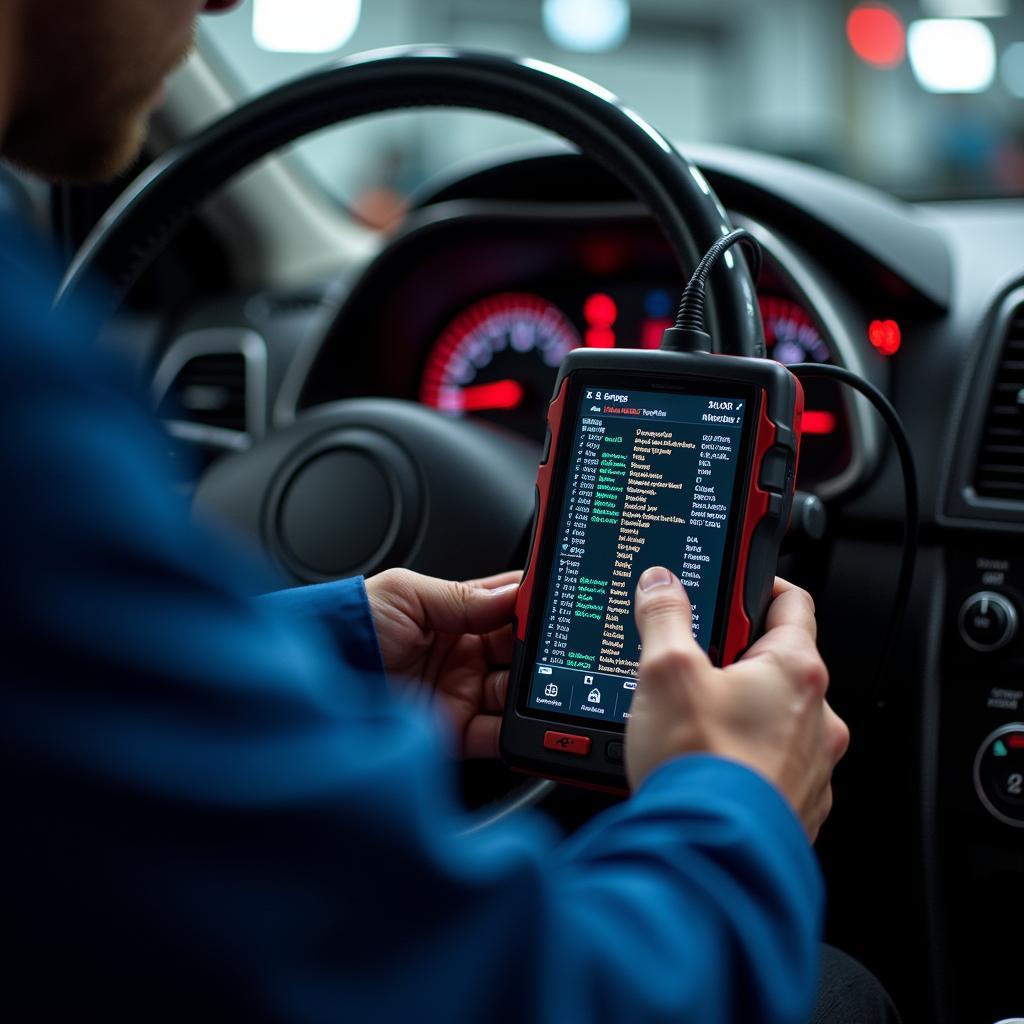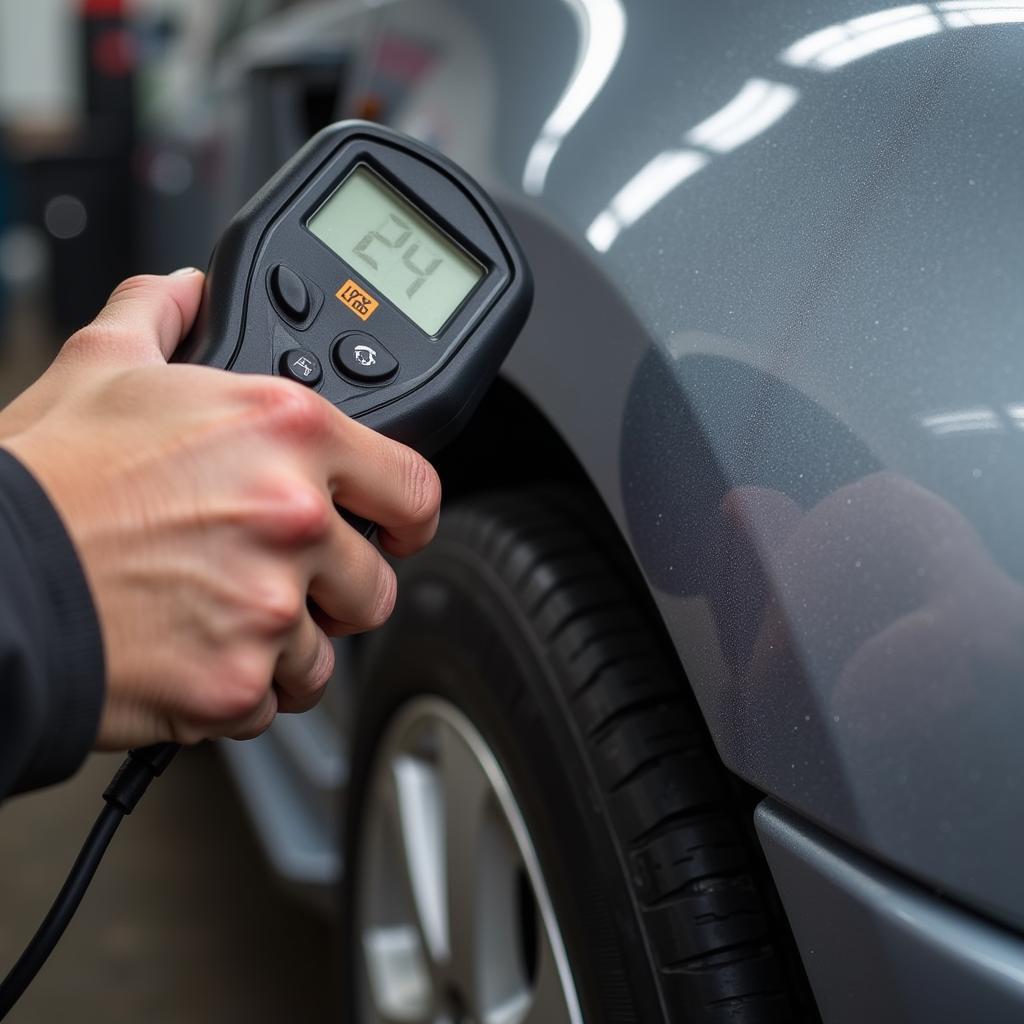A car inspector utilizes a range of specialized tools to assess a vehicle’s condition thoroughly. Understanding What Tools Use Car Inspectors helps buyers and sellers alike appreciate the depth of a professional inspection. From diagnostic scanners to paint thickness gauges, these tools provide crucial insights into a car’s history and potential problems. Let’s dive into the essential equipment a car inspector uses.
 Car Inspector Using Diagnostic Tools
Car Inspector Using Diagnostic Tools
Car inspectors rely on a diverse toolkit to ensure a comprehensive assessment. These tools go beyond a simple visual inspection, offering a detailed understanding of a vehicle’s mechanical, electrical, and structural integrity.
Essential Car Inspector Tools
Diagnostic Scanners: Unveiling Hidden Issues
A diagnostic scanner, often considered a car inspector’s best friend, is a crucial tool that reads a vehicle’s onboard computer system. This tool retrieves diagnostic trouble codes (DTCs) which indicate potential problems with the engine, transmission, and other electronic systems. Modern scanners can access a wealth of information, including mileage, airbag deployment history, and even previous maintenance records. Knowing what a car inspector tool is like this helps understand the value of a professional inspection.
- Code Readers: Basic code readers identify existing DTCs, providing a starting point for further investigation.
- Enhanced Scanners: These advanced tools offer live data streaming, allowing inspectors to monitor sensor readings in real-time and identify intermittent issues.
- Specialized Scanners: For specific makes and models, these scanners provide in-depth access to proprietary systems.
Mechanical Inspection Tools: Assessing the Core Components
Beyond electronic diagnostics, car inspectors use various mechanical tools to assess the physical condition of a vehicle.
- Compression Testers: These tools measure the pressure within each cylinder, revealing potential problems with piston rings, valves, or head gaskets.
- Leak Down Testers: By introducing compressed air into the cylinders, leak down testers pinpoint the source of compression loss, helping diagnose internal engine issues.
- Stethoscopes: A mechanic’s stethoscope helps identify unusual noises within the engine, transmission, and other components.
“A thorough inspection is like peeling back the layers of a car’s history,” says John Smith, a certified automotive technician with over 20 years of experience. “These tools help us uncover potential problems that might not be apparent to the naked eye.”
Body and Paint Inspection Tools: Uncovering Hidden Damage
Identifying previous bodywork and paint repairs is crucial for assessing a vehicle’s history. Tools to find hidden damage in cars are essential for this.
- Paint Thickness Gauges: These devices measure the thickness of the paint layers, revealing areas that have been repainted or filled with body filler. Inconsistencies in paint thickness can indicate previous accident damage or shoddy repairs.
- Magnet: A simple magnet can help detect the presence of body filler, which is non-magnetic, under the paint surface.
 Paint Thickness Gauge on Car Body
Paint Thickness Gauge on Car Body
Conclusion
Understanding what tools use car inspectors is vital for both buyers and sellers. These tools provide a comprehensive assessment of a vehicle’s condition, uncovering potential problems and providing valuable insights into its history. From diagnostic scanners that unveil electronic issues to mechanical tools that assess the core components, a car inspector’s toolkit is designed to provide peace of mind. By utilizing these specialized tools, inspectors ensure a thorough and accurate evaluation, empowering informed decisions. Remember, a professional car inspection is an investment in confidence and can save you from costly surprises down the road. Understanding what tools car inspectors use helps you appreciate the value of their expertise.
FAQ
- What is a diagnostic scanner used for?
- Why is a compression test important?
- How does a paint thickness gauge work?
- What are some common problems a car inspector can find?
- What is the difference between a code reader and an enhanced scanner?
- Why is it important to use specialized scanners for certain car makes and models?
- How can a mechanic’s stethoscope help during an inspection?
“Investing in a pre-purchase inspection can save you thousands in the long run,” adds Jane Doe, lead mechanic at a reputable auto repair shop. “It’s always better to know what you’re getting into before you buy.” Are you looking for tools for a specific job? Check out the real estate tool kit for car. Or perhaps a career change using tools? Explore the best career change from tool and die or even an ak machine tools pithampur career.
For assistance, contact us via WhatsApp: +1(641)206-8880, Email: [email protected] or visit us at 910 Cedar Lane, Chicago, IL 60605, USA. We have a 24/7 customer support team.

Leave a Reply